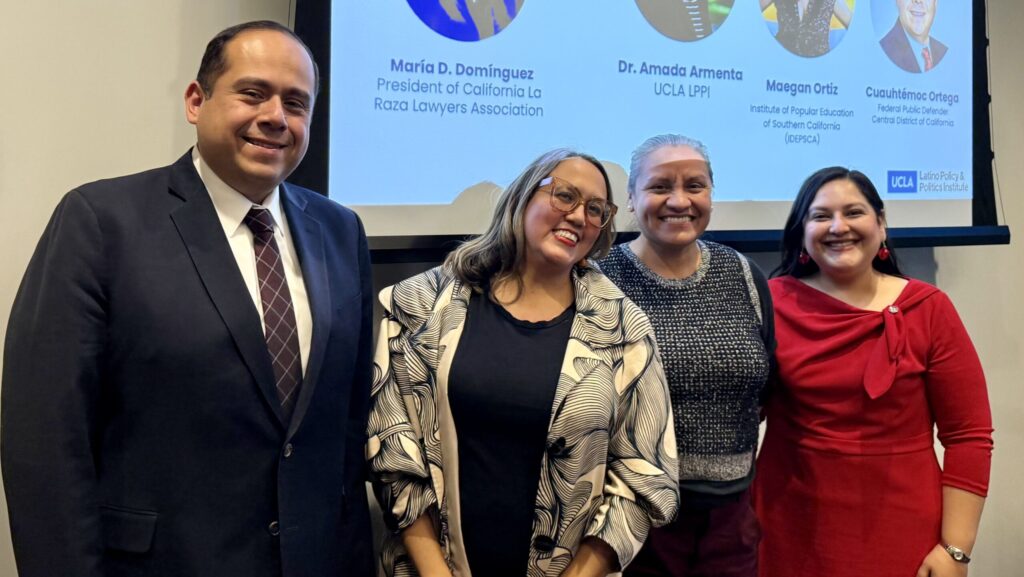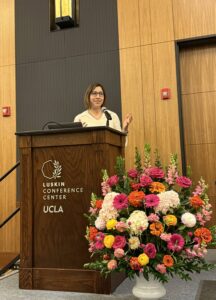Inaugural California Latino Bench-Bar Leadership Summit Convenes at UCLA

An LPPI report published in the spring of 2025 found that while Latinos make up 40% of California’s population, they only comprise 6% of attorneys and 12% of seats on the Courts of Appeal. Additionally, Latinos have never had more than one justice serving simultaneously on the California Supreme Court.
These disparities are why about 300 Latino lawyers, advocates, and judges gathered at the inaugural California Latino Bench-Bar Leadership Summit, held on October 17-18. LPPI served as a co-convener and thought partner, with faculty director Amada Armenta and senior research analyst Gabriella Carmona leading panels on the urgency of securing Latino civic and judicial representation.

The event kicked off on Friday, October 17, with remarks from leaders in the legal space, including Cynthia Grande, president of the Latina Lawyers Bar Association, and Michael Waterstone, dean of the UCLA School of Law. California Chief Justice Patricia Guerrero, the first-ever Latina to lead the state’s highest court, delivered the evening’s keynote address on the importance of diversity and increased Latino representation in the judiciary.
“When the Chief Justice spoke, she spoke with passion, with heart, and really leaning into what is happening today,” said Judge Sergio C. Tapia II, Presiding Judge of the Los Angeles County Superior Court. “I truly believe that she was able to do that because of the people in the room, because of the energy and the power that comes from coming together.”
Programming on Saturday, October 18, featured an opening plenary from Judge Tapia and three sessions of five concurrent thematic tracks: 1) Law Pathways, 2) New & Early Career Attorneys, 3) Mid- and Senior-Level Attorneys, 4) Judicial Pathways, and 5) Building Political Power.
During her panel, Armenta presented statistics demonstrating that Latinos are the Country’s fastest-growing population, accounting for half of new eligible voters since 2020. Despite this, Latinos remain critically underrepresented in positions of power and overrepresented in positions of marginalization and oppression. She was joined by Maegan Ortiz, executive director of the Institute of Popular Education of Southern California (IDEPSCA), and Cuauhtémoc Ortega, federal public defender of the Central District of California.
“All of California’s power in the economy comes on the backs of our work, of our parents’ work, of our communities’ work,” Armenta said during the discussion. “I’m looking forward to the day when we are not talked about as a sleeping giant – We are a giant that has awoken.”
Later that afternoon, Carmona took the stage alongside Judge Tapia and Judge Raquel A. Márquez, the first Latina judge on the Riverside County Superior Court, to discuss methods for increasing Latino judicial representation.
She presented key data and policy recommendations from Balancing the Bench: Assessing Latina and Latino Representation in California’s Judiciary. The analysis, coauthored by Carmona, found that no California appellate court had proportional Latino representation on the bench, and Latinas were the most underrepresented group.
Carmona led the panel in a conversation about increasing coordination between Latino bar associations and judges for endorsements in the judicial appointment process, encouraging more diverse legal backgrounds and professionals to join the bench, and improving judicial mentorship opportunities for legal professionals.
Judge Tapia called on attendees to build on the energy of the summit by uniting to elect a Latino to the California Supreme Court following Justice Martin Jenkin’s retirement on Oct. 31.








